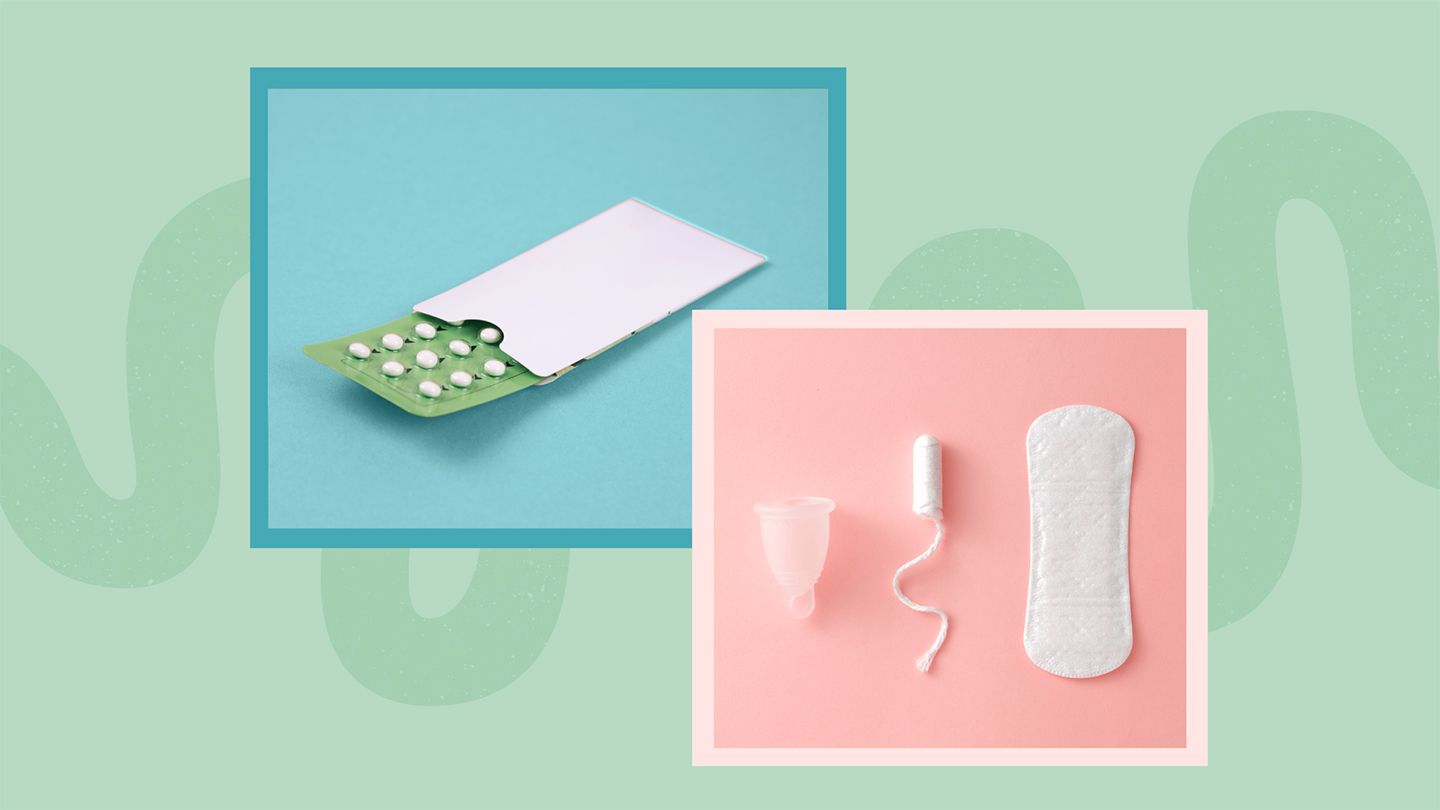More than 65 percent of women ages 15 to 49 in the United States use some form of birth control, and many of them are on hormonal birth control methods like the pill, patch, ring, implant, injections, or IUD.e60dc2a1-f33c-4a05-9b50-8e3e8e597629e1aa8717-2c7b-48f5-b6dc-8b2a1a19e5af These products contain estrogen, progestin (a synthetic version of progesterone), or both — hormones that naturally rise and fall during each menstrual cycle.e60dc2a1-f33c-4a05-9b50-8e3e8e59762947399411-8b8b-4826-ae90-94423e468087e60dc2a1-f33c-4a05-9b50-8e3e8e5976294d3452ab-e4cf-4c49-92ca-8b1134a2f5be Introducing these hormones in controlled amounts prevents pregnancy by stopping ovulation (the monthly release of an egg) or by thickening cervical mucus so sperm can’t reach the egg. Birth control also thins the uterus lining to prevent a fertilized egg from implanting and growing.e60dc2a1-f33c-4a05-9b50-8e3e8e59762947399411-8b8b-4826-ae90-94423e468087 Some women eventually decide to go off hormonal birth control because they want to get pregnant, are worried about side effects, or want to switch to another birth control method. But what happens to your body after stopping birth control?
Understanding Hormonal Changes After Stopping Birth Control Changes The time it takes for the hormones from birth control to clear out of your system depends on the birth control method used. After removing an IUD or implant, your hormones should go back to pre-birth-control levels right away. Levels drop within 36 hours after going off the pill.e60dc2a1-f33c-4a05-9b50-8e3e8e597629cae45169-2733-4d50-84d3-f1ed511f04b9 After removing the patch, hormone levels return to normal within a month,e60dc2a1-f33c-4a05-9b50-8e3e8e59762985e99ad1-38a5-472e-87f2-391db810eff9 and with a vaginal ring, within one to three months. With both the patch and ring, however, pregnancy can occur even if your cycle hasn’t become regular yet.e60dc2a1-f33c-4a05-9b50-8e3e8e5976291cba16a8-6e2c-46d5-81a5-f7069fbe3818 Hormone levels take longer to recover after the Depo-Provera shot because it suppresses ovulation for three months at a time. It could take up to nine months to get all the hormones from the shot out of your system and start ovulating again.e60dc2a1-f33c-4a05-9b50-8e3e8e597629cae45169-2733-4d50-84d3-f1ed511f04b9 After going off birth control, it takes time for the body’s natural hormone balance to return and for ovulation to fully recover. How long that takes varies from person to person. Some women go right back into their normal cycles. Others have such a strong suppressive effect from hormonal birth control that it takes much longer for their cycles to recover and their periods to restart. “In some cases, it’s maybe two to three months after the last tablet before they reach that normal cyclic baseline state,” says Rhiana Saunders, MD , a reproductive endocrinologist and infertility specialist at Aspire Houston Fertility Institute in Texas.
Resuming Your Menstrual Cycle Resuming Your Cycle Give your body time to adjust to the new hormone levels after going off birth control. Some people take longer than others to adjust. Period frequency and symptoms could be different for a while. Common Symptoms and Changes to Anticipate It’s normal for women to have side effects after going off birth control, as their body adjusts from outside hormones to its own natural hormones. “The first period after stopping birth control may be heavier, longer, and more painful than usual,” says Chadwick Leo, DO , medical director of Pardee OB/GYN Associates in Hendersonville, North Carolina. Dr. Leo says other symptoms that can happen after going off birth control are:e60dc2a1-f33c-4a05-9b50-8e3e8e597629e16329ad-d193-4cf4-8047-a8ebfcf8f45f More or less frequent periods Mood changes such as irritability, anxiety, or depression PMS symptoms like bloating and nausea Weight gain or loss Headaches Changes in libido Acne Breast tenderness Unwanted hair growth “These physical and emotional changes happen because hormonal birth control methods artificially regulate hormone levels,” Leo says. “When these are stopped, the body’s natural hormonal process kicks back in as the body adjusts.” The types and intensity of symptoms depend on what your cycles were like before you started taking birth control, he says. Some women don’t get any periods for many months after stopping birth control. Doctors call this post-pill amenorrhea , and it’s more common if your cycle was irregular prior to taking the birth control pill.e60dc2a1-f33c-4a05-9b50-8e3e8e5976299146c75d-afd9-4bb6-8fee-b95135f9ac4e “If you’re bleeding within 28 to 35 days after a last tablet, then your body has likely picked up where it left off,” says Dr. Saunders. If it’s been over three months and your period still hasn’t returned, it’s recommended to take a pregnancy test and consult your doctor, to rule out other possible medical issues.e60dc2a1-f33c-4a05-9b50-8e3e8e5976299146c75d-afd9-4bb6-8fee-b95135f9ac4e Fertility and Conception After Birth Control For women who want to get pregnant, it shouldn’t take long for menstrual cycles to go back to normal. “Fertility typically resumes within one to three months after stopping birth control,” says Leo. Birth control only temporarily stops ovulation. It shouldn’t have any impact on your long-term fertility or ability to conceive, whether you took it for a short period of time or for many years.e60dc2a1-f33c-4a05-9b50-8e3e8e597629685a51ad-de91-4fe3-b867-0c2affdb2e54 An older, large review of studies showed that 83 percent of women who went off their contraception got pregnant within one year afterward. Fertility returned at about the same rate after the pill, IUD, and other birth control methods.e60dc2a1-f33c-4a05-9b50-8e3e8e597629608680c3-1928-4ba1-8420-4ea4009f968b Newer data shows similar results: 65 to 85 percent of women became pregnant within a year of stopping birth control, with some variation based on different birth control types.e60dc2a1-f33c-4a05-9b50-8e3e8e5976299b845e4c-e724-4b01-a1f2-11b841849775
Addressing Health Concerns and When to Seek Medical Advice When to See a Doctor If you haven’t started your period again and it’s been two months or more after you stopped taking birth control, Saunders recommends seeing your ob-gyn for a check of your hormone levels. If you’re actively trying to conceive, you’ll want to make an appointment sooner, and may choose to have more tests done, if necessary. Severe Physical or Emotional Symptoms Mild symptoms like mood changes, headaches, or heavier periods are normal after stopping birth control. Following IUD removal, some women have cramps, light bleeding, or bloody discharge.e60dc2a1-f33c-4a05-9b50-8e3e8e597629b143492c-2b7c-48bc-8d6c-60410ce967e7 More severe symptoms like heavy bleeding, lots of clots, or severe pain aren’t normal and should be reported to a doctor. It’s normal to experience more moodiness, but some women actually feel better when they come off hormonal birth control. “It’s pretty rare for me to find a patient who feels more depressed after stopping a pill, unless she was taking it for premenstrual dysphoric disorder,” Saunders says.
The Takeaway Hormonal birth control methods like the pill, patch, shot, ring, and IUD prevent pregnancy by stopping ovulation or thickening cervical mucus so sperm can’t reach the egg. Hormone levels should return to baseline shortly after stopping birth control, although it may take a few months for them to normalize after the shot. It’s common to have symptoms like moodiness, heavier periods, weight changes, and bloating after stopping hormonal birth control. Menstrual cycles and fertility should resume within one to three months after stopping most birth control methods, and up to nine months after using the shot.
Resources We Trust Mayo Clinic: Birth Control Pill FAQ: Benefits, Risks, and Choices Brown University Health: Getting Off Birth Control: Frequently Asked Questions University of Rochester Medical Center: What Does It Feel Like to Stop Birth Control? Cleveland Clinic: Female Infertility MedLinePlus: Test Your Knowledge About Birth Control
Read the full article here
Leave a comment




